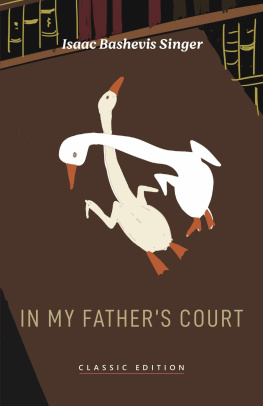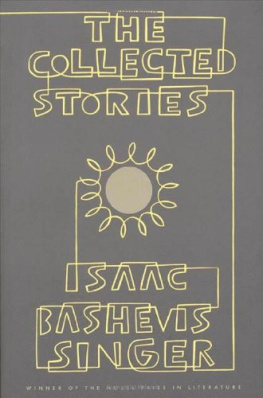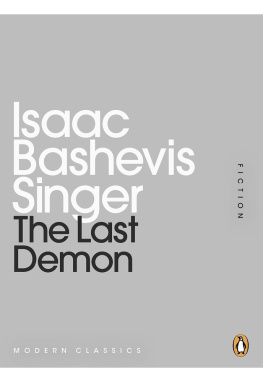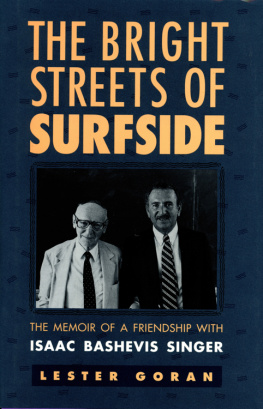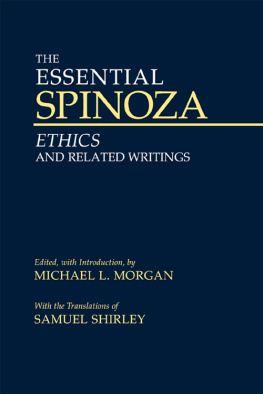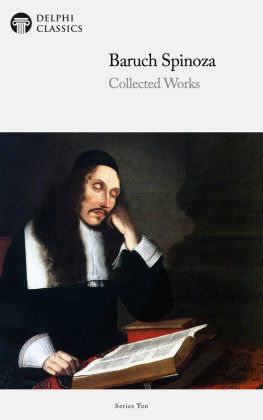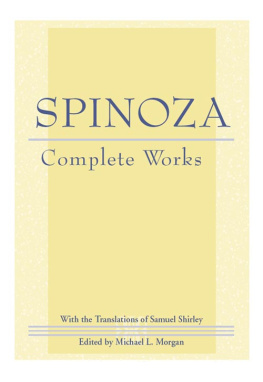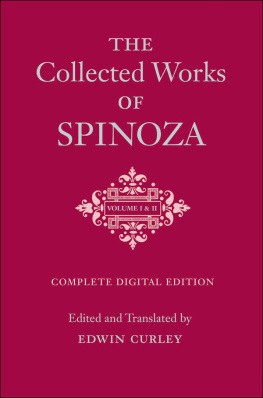Isaac Bashevis Singer - Spinoza of Market Street and Other Stories
Here you can read online Isaac Bashevis Singer - Spinoza of Market Street and Other Stories full text of the book (entire story) in english for free. Download pdf and epub, get meaning, cover and reviews about this ebook. year: 1979, publisher: Farrar, Straus and Giroux, genre: Detective and thriller. Description of the work, (preface) as well as reviews are available. Best literature library LitArk.com created for fans of good reading and offers a wide selection of genres:
Romance novel
Science fiction
Adventure
Detective
Science
History
Home and family
Prose
Art
Politics
Computer
Non-fiction
Religion
Business
Children
Humor
Choose a favorite category and find really read worthwhile books. Enjoy immersion in the world of imagination, feel the emotions of the characters or learn something new for yourself, make an fascinating discovery.

- Book:Spinoza of Market Street and Other Stories
- Author:
- Publisher:Farrar, Straus and Giroux
- Genre:
- Year:1979
- Rating:4 / 5
- Favourites:Add to favourites
- Your mark:
- 80
- 1
- 2
- 3
- 4
- 5
Spinoza of Market Street and Other Stories: summary, description and annotation
We offer to read an annotation, description, summary or preface (depends on what the author of the book "Spinoza of Market Street and Other Stories" wrote himself). If you haven't found the necessary information about the book — write in the comments, we will try to find it.
Isaac Bashevis Singer: author's other books
Who wrote Spinoza of Market Street and Other Stories? Find out the surname, the name of the author of the book and a list of all author's works by series.
Spinoza of Market Street and Other Stories — read online for free the complete book (whole text) full work
Below is the text of the book, divided by pages. System saving the place of the last page read, allows you to conveniently read the book "Spinoza of Market Street and Other Stories" online for free, without having to search again every time where you left off. Put a bookmark, and you can go to the page where you finished reading at any time.
Font size:
Interval:
Bookmark:
Talk about a holy man! Our powers are not theirs; their ideas are not for us to understand! But let me tell you what happened to my own father-in-law.
At the time, I was still a young man, a mere boy, and a follower of the rabbi of Kuzmir--who was there more worthy? My father-in-law lived in Rachev, where I boarded with him. He was a wealthy man and ran his house in a grand manner. For instance, look at what happened at meal times. Only after I had washed my hands and said the blessing, did my mother-in-law take the rolls from the oven. So that they were still hot and fresh! She timed it to the very second. In my soup, she put hardboiled eggs. I wasn't accustomed to such luxuries. In my own home the loaves of bread were baked two weeks in advance. I used to rub garlic on a slice, and wash it down with cold well water.
But at my father-in-law's everything was fancy--brass door latches, copper pans. You had to wipe your boots on a straw mat before crossing the threshold. And the fuss that was made about brewing coffee with chicory! My mother-in-law was descended from a family of Misnagids--the enemies of the Hasids--and to Misnagids the pleasures of this world mean something.
My father-in-law was an honest Jew, a Talmudic scholar; also a dealer in timber, and a mathematician of sorts. He used to have his own hut in the forest; and took a gun and two dogs when he went there, because of robbers. He knew logarithms; and by tapping the bark of a tree with his hammer, could tell if the tree were as sound inside as out. He knew how to play a game of chess with a Gentile squire. Whenever he had a free moment, he read one of the Holy Books. He carried the "Duty of the Heart" about with him in his pocket. He smoked a long pipe with an amber mouthpiece and a silver cover. He kept his prayer shawl in a hide bag, and for his phylacteries he owned silver cases.
He had two faults. First of all, he was a fervent Misnagid. What a Misnagid--he burned like fire! He called the Hasids "the heretics" and he was not ashamed to speak evil of the saintly Baal Shem himself. The first time I heard him talk like that I shuddered. I wanted to pack up and run away. But the rabbi of Kuzmir was against divorce. You married your wife, not your father-in-law. And he told me Jethro, Moses' father-in-law, hadn't been a Hasid either. I was amazed. Jethro later became a holy man. But that's putting the cart before the horse....
My father-in-law's second fault was his uncontrollable anger. He had been able to conquer all his other moral weaknesses, but not that one. If a merchant did not repay a debt on time and to the penny, he called him a swindler and refused to have any further dealings with him. If the town shoemaker made him a pair of boots, and they were a little too tight or too loose, he harangued him heartlessly.
Everything had to be just so. He had gotten it into his head that Jewish homes had to be as clean as those of the Christian squires, and he insisted that his wife let him inspect the pots and pans. If there was a spot on them, he was furious. There was a joke about him: that he had discovered a hole in a potato grater! His family loved him; the town respected him. But how much bad temper can people take? Everybody became his enemy. His business partners left him. Even my mother-in-law couldn't stand it any more.
Once I borrowed a pen from him. I forgot to return it immediately, and when he wanted to write a letter to Lublin, he began hunting. Remembering that I had it, I hastened to give it back. But he had fallen into such a rage that he struck me in the face. Well, if one's own father does a thing like that, it's his privilege. But for a father-in-law to strike a son-in-law: it's unheard of! My mother-in-law became sick from what had happened; my wife wept bitterly. I myself wasn't that upset: What was the tragedy? But I saw that my father-in-law was eating his heart out, regretting it. So I went to him. "Father-in-law," I said. "Don't take it to heart. I forgive you."
As a rule he spoke very little to me. Because if he was particular about everything, I was lax. When I took off my coat, I never remembered where I had put it. If I was given some coins, I promptly misplaced them. And though Rachev was a tiny village, when I went beyond the market place, I could no longer find my way back. The houses were all alike, and I never looked at the women within. When I got lost, I would open a cottage door and ask, "Doesn't my father-in-law live here?" Those inside would always begin to titter and laugh. Finally I took a vow never to walk anywhere except straight from my home to the study house and back again.--Only later did it occur to me that near my father-in-law's house stood a landmark: a thick tree with deep roots, which must have been two hundred years old.
Anyway, for one reason or another, my father-in-law and I were always quarreling, and he avoided me. But after the incident of the pen, he talked to me. "Baruch, what shall I do?" he said. "I'm a bad-tempered man. I know the sin of anger is as evil as that of idolatry. For years I've tried to control my temper, yet it only gets worse. I'm sinking into hell. In worldly matters too, it's very bad. My enemies want to destroy me. I'm afraid I'll end up without bread in the house."
I answered: "Father-in-law, come with me to Rabbi Chazkele of Kuzmir."
He turned pale. "Have you gone mad?" he shouted. "You know I don't believe in wonder-rabbis!"
I held my tongue. First, because I didn't want him to scold me as he always regretted it later. And, second, I didn't want him to go on slandering a holy man.
Imagine then: After the evening prayer, he came over to me and said: "Baruch, we're going to Kuzmir." I was stupefied. But why go into that.... He had decided to go, and we began to prepare for the journey immediately. As it was winter, we had to hire a sleigh. A deep snow had fallen and the road was far from safe; the forests were full of wolves; nor was there any lack of highwaymen. But we had to go right away. Such was my father-in-law's nature! My mother-in-law thought--heaven forbid--that he had lost his mind. He put on his fur coat, a pair of straw overshoes, and said the special prayer for a journey. I found the whole thing a great adventure. Wasn't I going to Kuzmir and taking my father-in-law with me? Who could be happier than I? Yet I trembled with fear, for who knew what would happen there!
On the journey, my father-in-law didn't utter a word. It snowed the whole way. The fields as we passed were full of swirling snowflakes. Philosophers say the shape of each flake is unique. But snow is a subject in itself. It comes from Heaven and lets us experience the peace of the other world. White is the color of mercy according to the cabala, while red signifies the law.
Nowadays snow is a trifle: it falls for a day or two at most. But in those days! Often it snowed for a month without stopping! Huge snowdrifts piled up; houses were buried; and everyone had to dig their way out. Heaven and earth merged and became one. Why does the beard of an old man turn white? Such things are all related.--At night, we heard the howling of beasts ... or perhaps it was only the sound of the wind.
We arrived in Kuzmir on a Friday afternoon. My father-in-law went to the rabbi's study to greet him. He was permitted to go in immediately. Since it was the middle of winter, few of the rabbi's disciples had come. I waited in the study house, my skin tingling. My father-in-law was by nature such a bullheaded man. He might very well talk back to Rabbi Chazkele. It was three-quarters of an hour before he came out, his face white as chalk above his long beard, his eyes burning like coals beneath his bushy eyebrows.
"If it wasn't the eve of the Sabbath, I would go home immediately," he said.
"What happened, father-in-law?" I asked.
Font size:
Interval:
Bookmark:
Similar books «Spinoza of Market Street and Other Stories»
Look at similar books to Spinoza of Market Street and Other Stories. We have selected literature similar in name and meaning in the hope of providing readers with more options to find new, interesting, not yet read works.
Discussion, reviews of the book Spinoza of Market Street and Other Stories and just readers' own opinions. Leave your comments, write what you think about the work, its meaning or the main characters. Specify what exactly you liked and what you didn't like, and why you think so.

